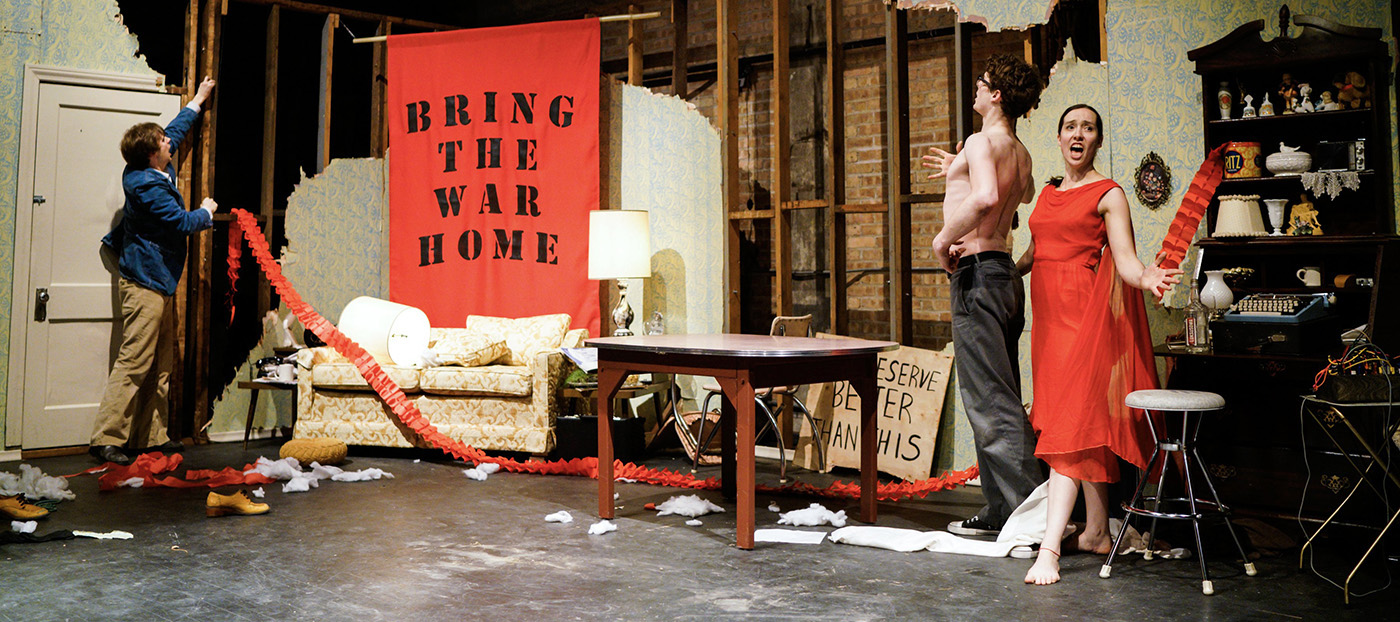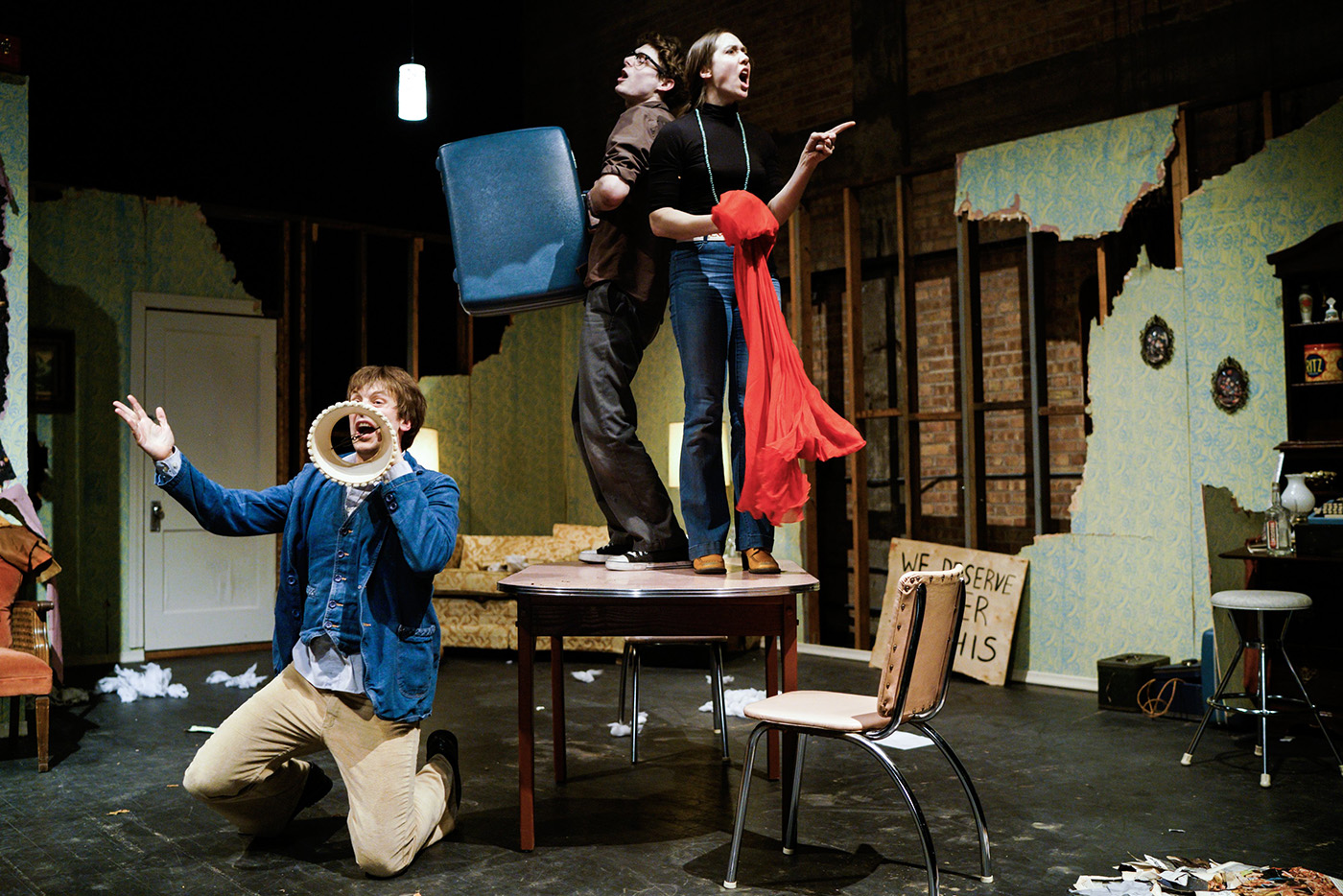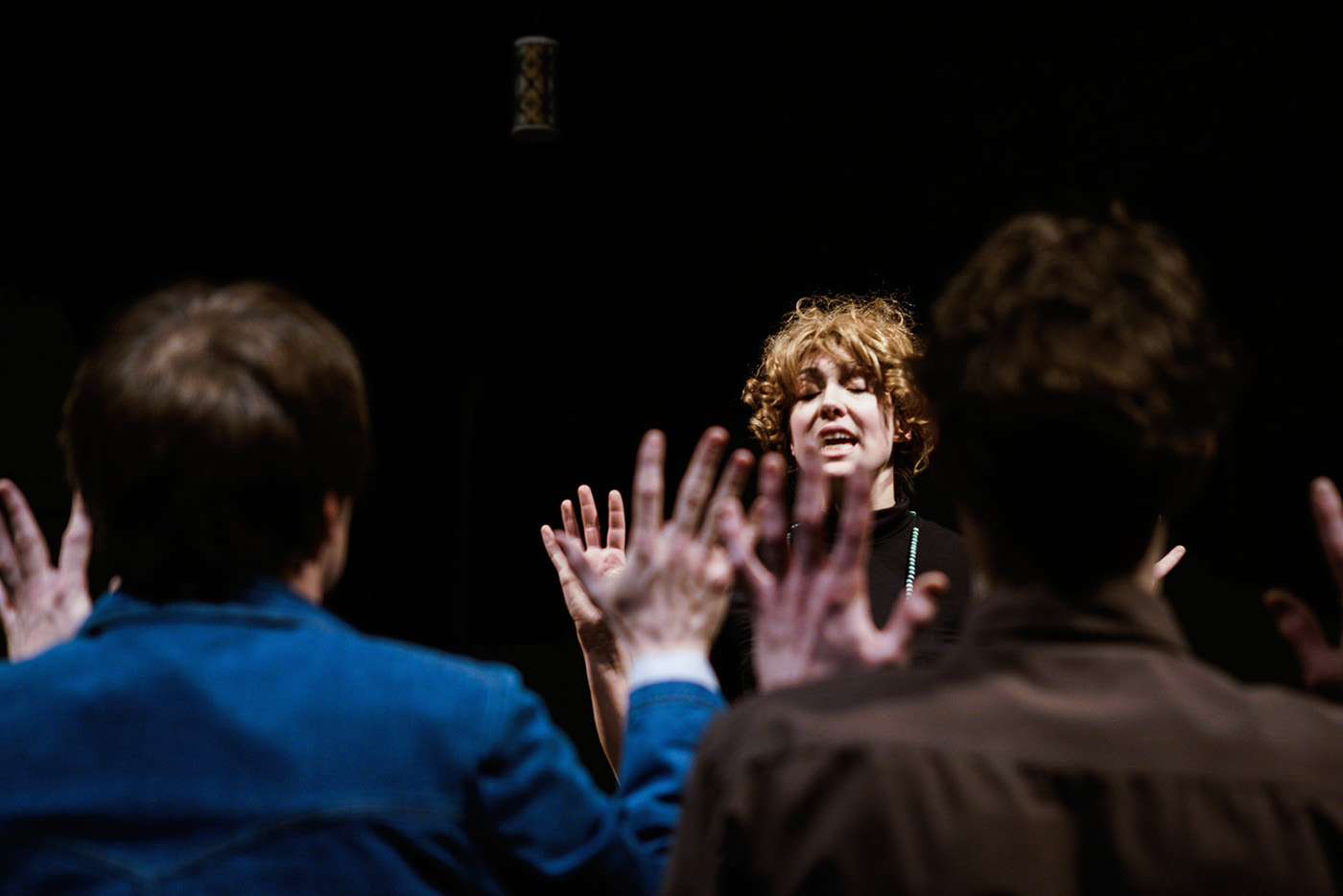
‘Radicalization Process’ at The Hinterlands in Detroit synthesizes history, personal politics and artistry
Above: “The Radicalization Process” crescendos into a rally. All photos by Alverno Presents/Kat Schleicher Photography, courtesy of The Hinterlands.
It would be impossible to boil down the astonishing complexity of “The Radicalization Process”–a new work by experimental theater ensemble The Hinterlands, made possible with support from Knight and other organizations–down into a single thesis. But if one were to try, it might be a statement oft-repeated throughout the course of the show: “The only war that matters is the war against the imagination; all other wars are subsumed in it.”
The statement is made and revisited by the three-person cast that forms the permanent core of Hinterlands: Liza Bielby, Richard Newman and Dave Sanders. Past productions have seen others take the lead–for example, Newman as ringmaster of a vaudeville-based walk through Detroit sub-culture, The Circuit (also funded by Knight)–but Bielby is the beating heart and commanding presence of this show, first greeting attendees in the basement of Play House, where she introduces us to a mysterious archive. We are informed that the archive was found when Hinterlands took control of the abandoned house, and through her obsession and subsequent organization of the water-damaged materials, Bielby sparked the impetus for the production about to take place.

The theatrics included singing, dancing and much climbing on the table.
The stated provenance of these materials is a little convenient, and further investigation suggests they are, in fact, the work of inaugural Write-A-House resident Casey Rocheteau. Nonetheless, they provide a provocative array of source materials, questions and background information on a series of subjects meticulously indexed within a laminated archive guide. Those topics include, but are not limited to: Black Panthers, the Weathermen, 1940s-1960s pop/consumer culture, method acting, Antigone, Timothy Leary, Vietnam, the draft, black power, white radicals, self-determination, and imagination. These materials act as the background for the show, and Bielby cannot contain her excitement to be sharing the archive work with an audience, interrupting the folks gathered and sifting through boxes in the basement to read out snippets from the files.
Once we enter the main stage, a row of seats lining two walls of Play House give us a view into a Detroit home–an exquisitely dilapidated and suggestive set designed by Knight Arts grantee Shoshanna Utchenik–in which a cell of radical 1970s activists are preparing to take action. Among the details from the basement files shared by Bielby is a transcript of a conversation, or perhaps an interrogation, which suggests that her character, Jude, is preparing to carry a suitcase bomb, built by Will (Sanders) and accompanied by a manifesto being mulled over by Lou (Newman), into an airport.

Bielby conducts a method acting session.
Hinterlands has long championed a rigorous process of mental and physical preparation, and offers open training sessions to introduce these methods to others. That work clearly pays off. The astonishingly physical performance that follows the seeming premature explosion of the suitcase bomb, and with it a fragmentation into a high-energy series of vignettes that draw the players in and out of any kind of conventional narrative.
These include the playing of a scene from the Greek myth, “Antigone.” The troupe first rehearses the play in the context of a method acting class, with nervous (unnamed) students Sanders and Newman led by a wigged Bielby in the role of overblown method acting teacher. “Be an animal!” she shouts at the bewildered Sanders. “NO! Be an animal with me!” Later, the rehearsal within the play seems to dissolve into a proper restaging, with Bielby-as-Antigone having a contentious dinner conversation with Newman-as-Creon–her uncle and the king, whom Antigone defies by burying her soldier brother (who fought against Creon’s army) against the royal directive to let him rot on the battlefield. Antigone as a character represents a woman of considerable privilege, who defies the state in the service of a higher sense of right and wrong, and has therefore historically been connected to radical left rhetoric.
These are just a few of many snippets of thought and interaction. “The Radicalization Process” moves like a fever dream, jumping from scene to scene, and masterfully incorporating and synthesizing its own imagery as it goes. The work is not just a powerful examination of real (and invented) history, not just an absolute tour de force of performing arts, and indeed not just a political polemic on the state of complacency within neo-liberalism–though it is all those things. But above all, it is a triumph of imagination, and to that end, a powerful weapon in the only war that matters. This production is artfully conceived, outstandingly executed and not to be missed.
“The Radicalization Process” will be performed April 28-30 and May 5-7 at Play House.
Recent Content
-
Artsarticle ·
-
Artsarticle ·
-
Artsarticle ·
